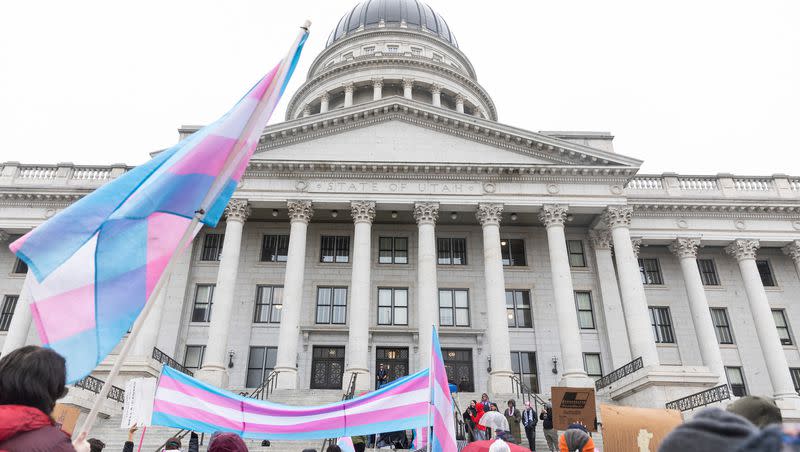Utah Gov. Cox signs transgender bathroom, DEI bills

Utah Gov. Spencer Cox signed a pair of this legislative session's most controversial bills Tuesday night. The move effectively ends diversity, equity and inclusion programs in state-owned schools, and bans transgender people from accessing restrooms that differ from their biological sex except in certain circumstances in state-owned buildings.
"We want public facilities that are safe and accommodating for everyone and this bill increases privacy protections for all," Cox said in a statement, explaining his reason for signing HB257.
The bill requires more unisex and single-stall facilities to be created in public buildings and only allows transgender people to use gender-specific bathrooms if they have undergone transgender-related surgery and changed their birth certificate to match their gender identity.
Transgender bathroom bill
Supporters of the bill have pleaded for increased privacy for women in restrooms, but critics have said a policy should focus on behavior, not on the gender identity of a person, and that it further stigmatizes transgender people.
The Legislature on Friday approved the bill after discussions between representatives and senators to resolve points of contention. Six lawmakers met briefly before adopting and approving a fifth substitute version of HB257, which bill sponsor Rep. Kera Birkeland, R-Morgan, said makes it "extremely clear" that students cannot be charged simply for using a restroom that doesn't align with their sex designation at birth.
"We never wanted any child to be given a criminal record just for being in a restroom," Birkeland said.
The bill applies only to government-owned buildings, not private businesses. The version of the bill that passed includes a provision that indemnifies government entities in the event they face lawsuits due to enforcing the law. The state would cover court costs.
Cox had signaled support for the bill, without directly promising to sign it, saying soon before the session began that he's concerned with protecting "women's spaces" while treating LGBTQ people "with dignity."
The Senate Minority Caucus in a statement Tuesday night expressed "profound disappointment" at the bills' signing. HB275, the caucus said, "unfairly targets transgender individuals by restricting their access to restrooms and changing rooms that align with their gender identity."
The caucus called the bill "discriminatory" and "a step backward in our ongoing fight for equality and acceptance of all." The group also questioned the bill's constitutionality and potential legal challenges resulting in "irresponsible" use of state funding.
Diversity, equity and inclusion bill
Meanwhile, supporters of HB261, which would end most state-sponsored diversity, equity and inclusion programs in their current form, have said they want to create opportunities for all who need assistance regardless of factors such as race.
HB261 would expand such initiatives to all students, not just Black students and others from marginalized groups, the traditional focuses. It would also prohibit universities and other public entities from requiring "diversity statements" of job applicants and aim to foster "academic freedom" on college campuses. The measure would apply to K-12 schools and other publicly funded entities.
"There is more work to be done. And it's up to all of us, and all of the people in our communities as we move forward, to treat each other with kindness and reach out to people in our communities and lift them up," bill sponsor Rep. Katy Hall, R-South Ogden, said in a hearing on the bill last week ahead of its passage. "Lift up those who need it, no matter what their circumstances."
Proponents of the bill say it will "level the playing field" for all university students with assistance and support. Critics worry students of color and others who have traditionally benefited from diversity, equity and inclusion initiatives could lose out.
"We've been concerned about some (diversity, equity and inclusion) programs and policies, particularly with hiring practices, and this bill offers a balanced solution. I'm grateful to the Legislature for not following the lead of other states that simply eliminated (diversity, equity and inclusion) funding with no alternative path for students who may be struggling. Instead, this funding will be repurposed to help all Utah students succeed regardless of their background," Cox said in his statement Tuesday night.
He added that Utah is "stronger because of our diversity" and emphasized his commitment to "keeping our state a place where everyone can thrive."
"Over the past three years, our administration has worked very intentionally with many community stakeholders to expand opportunities for all Utahns and we will continue to do so," he said.
Senate Democrats, in their statement, decried "erasing the progress we have made in building a more inclusive society" with the passage of HB261.
"(Diversity, equity and inclusion) programs are essential for fostering knowledge, understanding, empathy, and respect among our diverse population. By restricting their implementation, we are erasing the progress we have made in building a more inclusive society," the caucus said.

